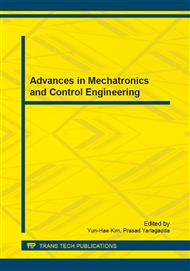[1]
Li,C.C., X.D. Lin, Zhou, X. Bao and J. Huang. Fuzzy control of electro-hydraulic servo systems based on automatic code generation. Proceeding of the 6th International Conference on Intelligent Systems Design and Applications, Oct. 16-18, IEEE Computer Society, Washington DC, USA, 2006, pp.244-247.
DOI: 10.1109/isda.2006.155
Google Scholar
[2]
Kwanchai Sinthipsomboon. Industrial Hydraulic, Se-education public company limited, 1987, pp.25-87.
Google Scholar
[3]
Darrel Janesak and Dave Roepp. Hybrids make a move to the plant floor, Hydraulics & pneumatics, August 2006, pp.32-49.
Google Scholar
[4]
Takayuki Imamura, Yuzo Sawada, Masashi Ichikawa, and Hirokazu Nakamura. Energy-Saving Hybrid Hydraulic System Comprising Highly Efficient IPM Motor and Inverter for Injection Molding and Manufacturing Machine , Japan, September 2008, pp.117-120.
DOI: 10.5739/isfp.2008.117
Google Scholar
[5]
Radek manasek. Simulation of a electrohydraulic Load-sensing system with ac motor and Frequency change, Czech Republic, Hamburg 2000, pp.311-324.
Google Scholar
[6]
Guo Rui and Zhao Jingyi Research of electro-hydraulic control system design and energy saving characteristic in the new drawbead test bed, International Conference on Fluid Power and Mechatronics , 17-20 Aug , 2011, pp.301-305.
DOI: 10.1109/fpm.2011.6045777
Google Scholar
[7]
Lovrec D., Deticek E., Faber F., Electro-Hydraulic Load Sensing with Close Control Actuator, Journal ofAdvance Production and Management, Vol 4, pp.93-109.
Google Scholar
[8]
J. -S. R. Jang and C. -T. Sun, Neuro-fuzzy modeling and control, Proceedings of the IEEE, vol. 83, pp.378-406, (1995).
Google Scholar
[9]
A. Jana, P. H. Yang, D. M. Auslander, and R. N. Dave, Real time neuro-fuzzy control of a nonlinear dynamic system, the 1996 Biennial Conference of the North American Fuzzy Information Processing Society - NAFIPS, Jun 19-22 1996, Berkeley, CA, USA, (1996).
DOI: 10.1109/nafips.1996.534733
Google Scholar
[10]
H. R. Berenji and P. Khedkar, Learning and tuning fuzzy logic controllers through reinforcements, IEEE Transactions on Neural Networks, vol. 3, pp.724-740, (1992).
DOI: 10.1109/72.159061
Google Scholar
[11]
H. R. Berenji, Neural networks for fuzzy logic inference, Second IEEE International Conference on Fuzzy Systems, Mar 28-Apr 1 1993, San Francisco, CA, USA, (1993).
DOI: 10.1109/fuzzy.1993.327597
Google Scholar
[12]
F. Azam and H. F. VanLandingham, Adaptive self organizing feature map neuro-fuzzy technique for dynamic system identification, The 1998 IEEE International Symposium on Intelligent Control, ISIC, Sep 14-17 1998, Gaithersburg, MD, USA, (1998).
DOI: 10.1109/isic.1998.713684
Google Scholar


